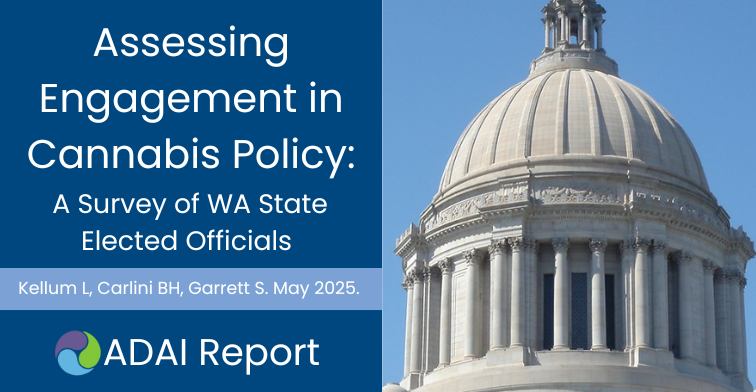New ADAI Report: Assessing Engagement in Cannabis Policy: A Survey of Washington State Elected Officials
05/14/2025
In 2012, Washington State passed Initiative 502, establishing a comprehensive regulatory framework for cannabis. This initiative allowed the state to license growers, processors, and retail stores.
The Washington State Liquor and Cannabis Board (LCB) handles licensing and regulation, while the state legislature makes cannabis laws.
Local governments, like cities and counties, can also make their own rules; for example, they can ban cannabis sales or choose where cannabis businesses can operate.
But what do elected officials think about cannabis policy and how engaged are they in the process?
This new ADAI report, by Lyndsey Kellum, MEd, Beatriz Carlini, PhD, MPH, and Sharon Garrett, MPH, MA, of ADAI’s Cannabis Education and Research Program (CERP), describes the results of a survey of 148 elected officials across the state (mostly city or town elected officials in jurisdictions where cannabis sales are legal), asking 22 questions about cannabis-related policy work, including economic opportunities, health impacts, and community policy priorities.
Key findings from the survey included:
- Policy engagement: Over a quarter (27.7%) of elected officials had worked on cannabis policy, with zoning/land use regulations and cannabis tax revenue being the most common focus areas.
- Barriers to policy work: Most elected officials did not perceive any significant barriers to their engagement on cannabis policies. Lack of staff time (48.2%) and limited knowledge of cannabis policy best practices (46.9%) were cited as posing some degree of barrier.
- Top concerns and priorities: Youth cannabis use (59.4%) and its negative health effects were the most pressing concerns; policies limiting youth exposure, such as restricting appealing packaging, received the strongest support.
- Interest and advocacy gaps: While 69.6% of respondents expressed interest in being involved in cannabis industry regulation, most had not been approached by stakeholders, indicating potential gaps in advocacy and engagement efforts.
This study offers important insights into elected officials’ cannabis policy priorities, providing a foundation for targeted public health advocacy, education, and informed policymaking at the local level.
Read the complete CERP/ADAI report here!
Be the first to know about new publications, events, funding opportunities and more! Subscribe to the ADAI News & Events blog!





